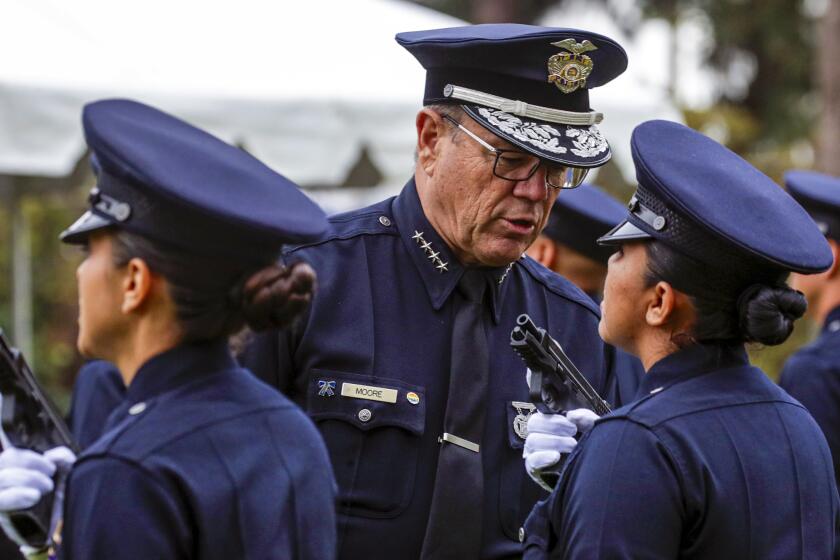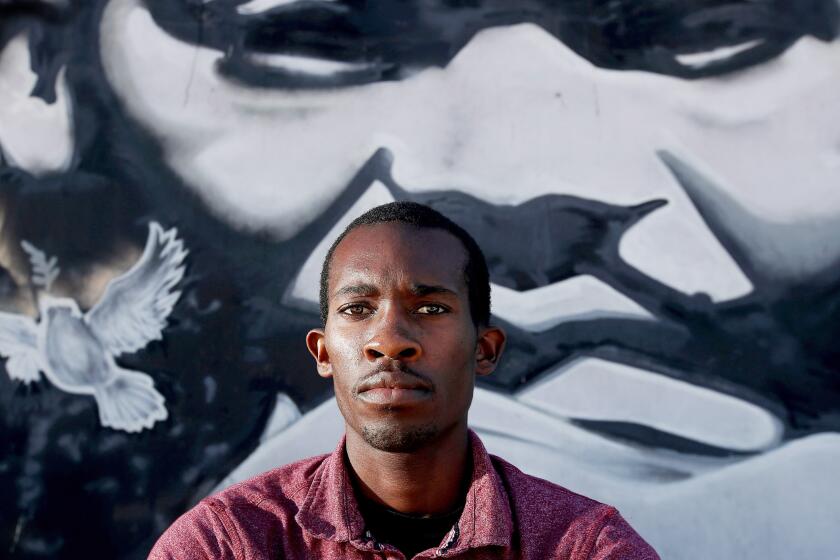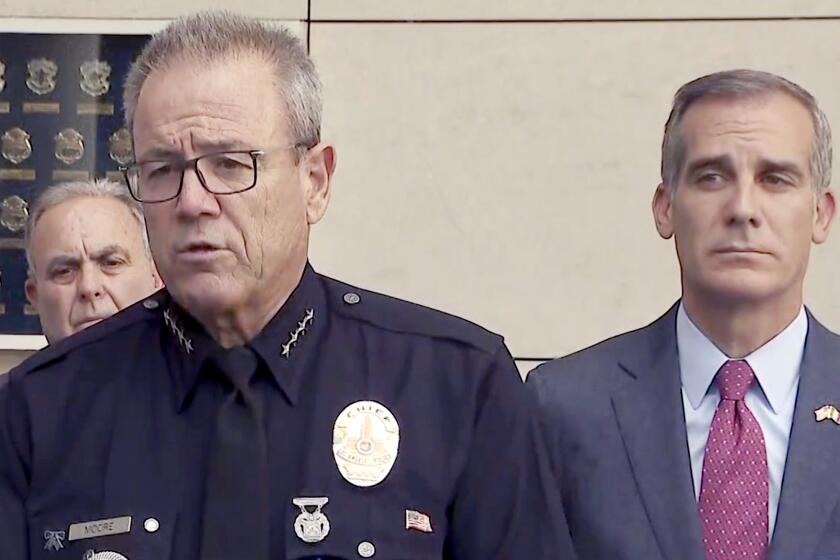In first public comments since stalking allegations, top LAPD official denies wrongdoing
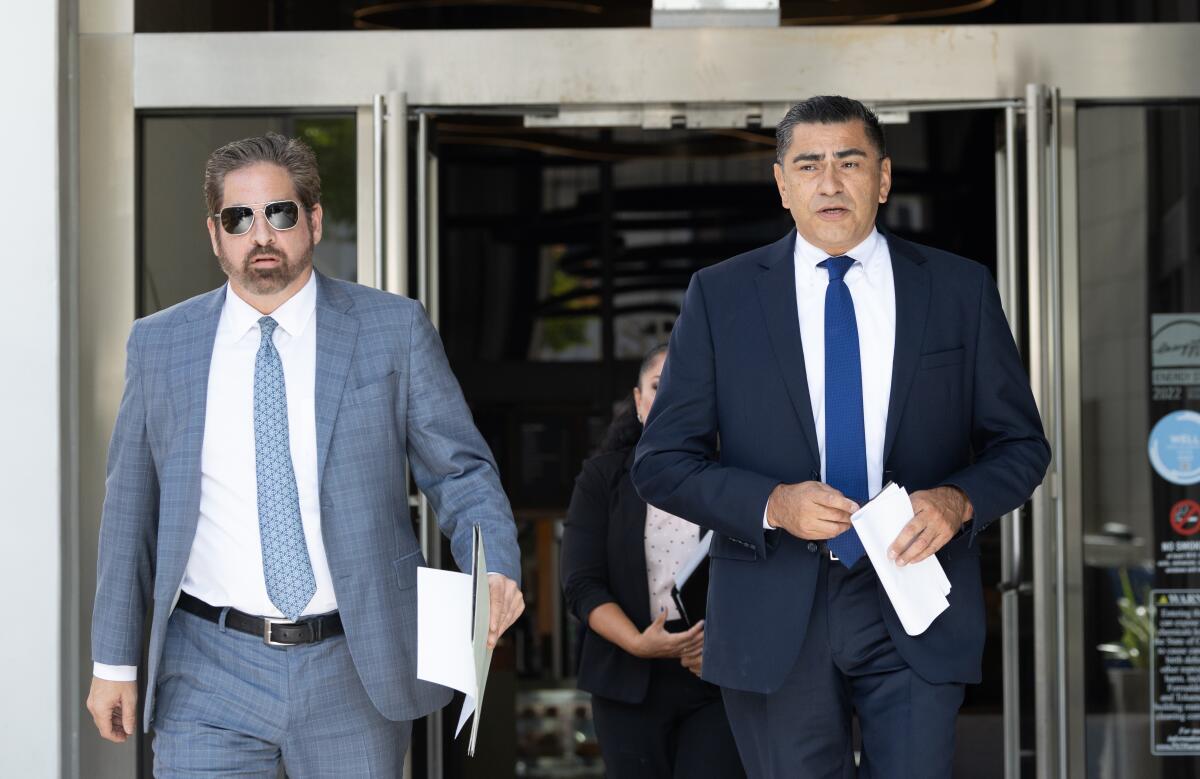
- Share via
Speaking publicly for the first time since the LAPD put him on leave earlier this month, former Assistant Chief Alfred “Al” Labrada dismissed allegations that he unlawfully tracked a former romantic partner as blatantly false, while also accusing department leadership of leaking private information in an attempt to “discredit” him.
Labrada called news coverage of the case, which has already resulted in his demotion and could end with his termination, a complete “mischaracterization of what had been alleged, along with the nature of our relationship.” But his most pointed jabs were saved for Chief Michel Moore.
“Before any investigation was completed, Chief Moore recklessly took significant actions inconsistent with my due process,” Labrada said at a news conference at his attorney’s Beverly Hills office. “I am genuinely disappointed in the leadership of the department who, after three decades of service, have not once reached out or called me to check on my well-being or that of my family.”
The female officer, who The Times isn’t naming because she is an alleged victim, last month accused Labrada of hiding an Apple AirTag in her car, allowing him to track her movements as she traveled to Palm Springs. The officer filed a report with Ontario police, leading the allegations to become public after The Times inquired about the case.
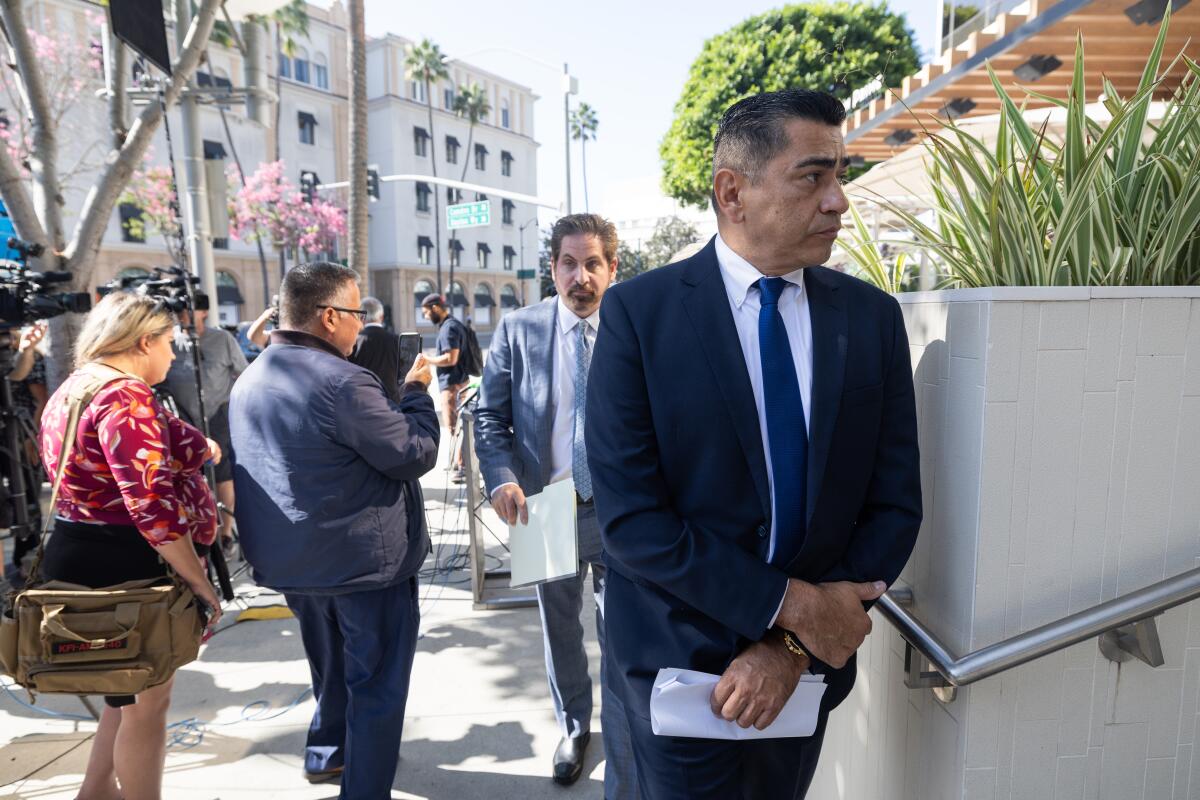
An LAPD spokesperson declined to comment.
Matthew McNicholas, an attorney for the officer who made the allegations, called the news conference a desperate attempt to get ahead of a potential lawsuit.
“I’m disappointed that there was a press conference with the knowledge that there’s going to be pending litigation, and ongoing internal investigation,” said McNicholas, who has litigated several high-profile lawsuits involving alleged wrongdoing by LAPD officers. “However, whatever label the commander and his defense team want to put on it, they can’t track my client with an electronic dog collar.”
At the news conference, Labrada’s attorney, Jeremy Tissot, accused news outlets of rushing to judgment and mischaracterizing Labrada’s actions as stalking — a label that carries a dark connotation. Tissot said the allegations against Labrada do not meet the state law’s definition of stalking.
“Anyone can file a police report,” Tissot said, adding that his comments were limited because of a pending LAPD disciplinary case against Labrada.
A string of recent controversies have put to a test LAPD Chief Michel Moore’s quest to get his department into shape before stepping down in the next year or two.
The legal definition of stalking “requires not only following or harassing, but an imminent threat,” he said. “Unfortunately, what it evoked, the harm that it’s done to this man, is that it sounds like someone who is a felon, who’s a dangerous felon. This man is everything ... that is the opposite of that. In fact, he fought to keep our city safe from such people.”
The attorney said coverage of the case had caused “irreparable harm” to Labrada, a 30-year department veteran who immigrated to America as a child and served in the Marines before climbing the ranks at the LAPD, becoming the highest-ranking Latino official on the force. Such representation is “important” in a city that is predominantly Latino, Tissot said.
Labrada stood behind his lawyer, stoic and silent, wearing a dark blue suit and blue tie. When it came his turn to speak, he read from a prepared statement and declined to take questions from reporters.
“What should have been a private matter became a public spectacle because of my title and employment with LAPD,” Labrada said. “Due to the lack of leadership, the process and manner with which this investigation was handled was not consistent, or was not equitable to other personnel investigations handled by the police department previously or currently being investigated.”
His comments echoed a double standard argument made in several other recent lawsuits against the department.
Bernard Robins, who was detained outside his parents’ South L.A. home by fellow LAPD officers, said the episode typifies the style of biased policing that’s practiced in some parts of the city.
“My employer added to the breach of privacy when they publicly provided my name and shared information with the media to discredit me and to add sensationalism to what was a personal matter,” Labrada continued. “They have not released names in the past in prior incidents of accusations.”
Labrada choked up briefly as he described how the ensuing media storm had caused him and his family “significant emotional and physical distress,” adding that he persevered thanks to their support.
The department, he said, violated state laws on officer privacy “by consistently providing information on a personnel matter to the public and friends, while there was still an ongoing investigation.”
“The department has even admitted to leaking privileged information regarding this incident investigation to members of the media to retaliate and discredit me,” he said.
The Times reviewed a copy of an investigative report prepared by an Ontario police detective and presented to prosecutors in San Bernardino County.
In the report, the detective wrote that he felt the available evidence supported the charge of “unlawful use of electronic tracking device.”
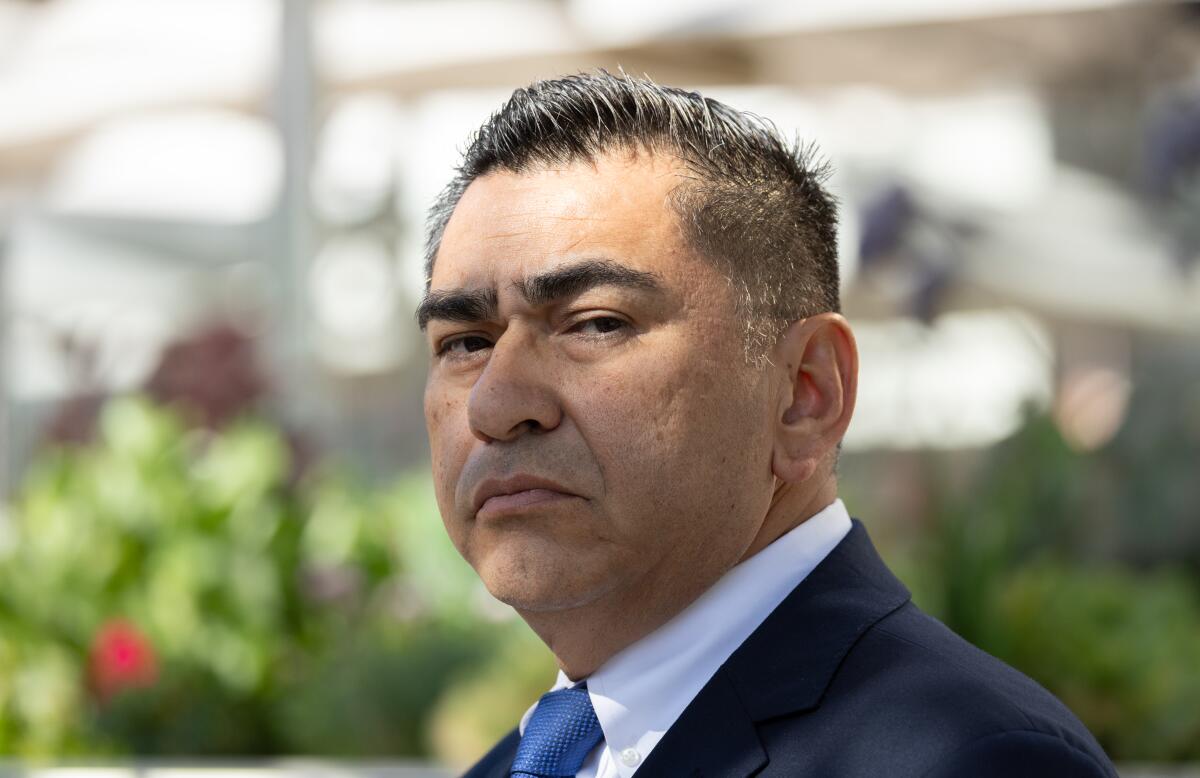
The investigation unearthed an email thread that began on Oct. 31, 2022, in which Labrada initially broke off his relationship with the woman. A little over a week later, he wrote her another email expressing a desire to speak to her, according to the report. On Nov. 13, 2022, Labrada bought an AirTag from Amazon and two days later texted an unidentified individual asking: “Do AirTags work in garage/building?” In the same text exchange, he clarified that he was not monitoring anyone.
The female officer told Ontario police that she was at a getaway with some friends at a hotel in Palm Springs on Sept. 3, 2023, when Labrada emailed her a copy of their domestic partnership separation agreement, according to the police report. The timing of the message led her to suspect that Labrada knew her whereabouts, and she asked a friend to help her inspect her car, according to the report. Their search turned up an AirTag that was attached to the undercarriage, behind the rear passenger wheel, the report said.
Investigators later obtained a search warrant that showed that the AirTag was linked to Labrada’s department-issued cellphone and was deactivated on Sept. 7 — the same day the initial report was filed with Ontario police.
When she showed up to file the report, the woman told officers she was afraid to bring the AirTag because it would alert whoever was tracking her to the fact that she had contacted the police.
Labrada is listed as an “involved” person in the initial report, which was reviewed by The Times.
Ontario police later found photos of an AirTag on Labrada’s phone and determined it was the same one that was found by his former partner, using the timeline feature from her Android phone and bank statements. The investigation determined that Labrada was not with the woman when he took the photos; in one instance, he was in the Bahamas, and another time he was at a Dodgers game. His former romantic partner told Ontario police that she didn’t give him permission to monitor her whereabouts.
“Based on the investigation, the Apple AirTag was not used for a law enforcement purpose,” the detective wrote.
The San Bernardino County Attorney’s office told The Times last week it did not have enough evidence to pursue charges following the police investigation. A spokesperson for the office has declined to provide the legal rationale for the decision, saying such explanations are given only in certain cases, notably police shootings.
In a recent court filing, former LAPD Cmdr. Nicole Mehringer contested her firing, arguing the department has overlooked — or even helped cover up — similar behavior by dozens of male supervisors.
“Our office has completed its review and determined not to file criminal charges, due to insufficient evidence proving guilt beyond a reasonable doubt,” said the spokeswoman, Jacquelyn Rodriguez, in an email.
Labrada has been on leave since earlier this month, and last week Moore confirmed he had demoted Labrada from assistant chief to the lower position of commander. Labrada was also directed to a board-of-rights disciplinary hearing, an indication the department is seeking to fire him.
Last week, Moore promoted Deputy Chief Blake Chow, who runs the West Bureau, to assistant chief overseeing the Office of Special Operations, replacing Labrada as the official in charge of detectives, special operations and counterterrorism and transit units. Chow, who joined the department in 1990, was most recently in charge of the department’s operations on the Westside after running the Transit Services Bureau for several years.
Labrada’s removal as assistant chief is not unprecedented. Former Chiefs William Bratton and Charlie Beck chose to demote assistant chiefs to commanders. Assistant chiefs serve under the authority of the chief and can be demoted without explanation.
In 2018, another assistant chief, Jorge Villegas, retired after sources told The Times he was having an improper sexual relationship with a female subordinate. An LAPD surveillance unit caught Villegas and the subordinate apparently engaged in a sex act in a parking lot, the sources said.
Villegas’ case resurfaced this year in a court filing from a former LAPD commander who is suing the department for retaliation.
Labrada’s comments on Tuesday marked a significant public break with Moore, a longtime ally who previously said he was disappointed in the recent conduct of senior officials who he thought could one day take the “reins” of the department.
In an interview this month, Moore acknowledged that the recent controversies had shaken public trust in the department but rejected the notion that they were signs of deeper, cultural problems.
Police Commission President Erroll Southers said he had ordered the inspector general’s office to monitor the LAPD’s investigation to ensure “objectivity, impartiality, going forward.”
Times staff writer Richard Winton contributed to this report.
More to Read
Sign up for Essential California
The most important California stories and recommendations in your inbox every morning.
You may occasionally receive promotional content from the Los Angeles Times.
